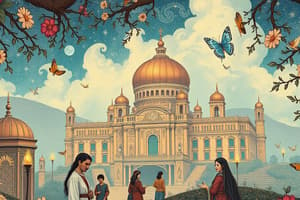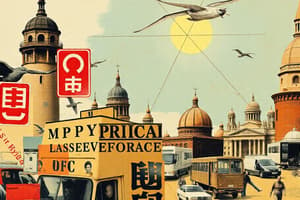Podcast
Questions and Answers
Which of the following are the two main categories of sources of ancient Indian history?
Which of the following are the two main categories of sources of ancient Indian history?
- Literary and Archaeological (correct)
- Religious and Secular
- Indian and Foreign (correct)
- Chronological and Thematic
What are the classifications of literary sources mentioned?
What are the classifications of literary sources mentioned?
Indian Literature and Foreign Literature
Who among the following opined that Indians did not pay much attention to the historical order of things?
Who among the following opined that Indians did not pay much attention to the historical order of things?
- Dr. Keith
- R.C. Majumdar
- Al-Beruni (correct)
- Buddhist Writers
Ancient Indians had a comprehensive historical sense and documented history extensively.
Ancient Indians had a comprehensive historical sense and documented history extensively.
What literature is considered more valuable as sources of history compared to Indian literature?
What literature is considered more valuable as sources of history compared to Indian literature?
The sacred literature is divided into three parts: Vedic texts, _____ texts, and Jain texts.
The sacred literature is divided into three parts: Vedic texts, _____ texts, and Jain texts.
Which of the following is NOT a type of sacred literature mentioned?
Which of the following is NOT a type of sacred literature mentioned?
Name one of the groups of foreign writers who wrote accounts on India.
Name one of the groups of foreign writers who wrote accounts on India.
Flashcards
Ancient Indian Historical Sources
Ancient Indian Historical Sources
Ancient Indian historical sources are primarily classified into two categories: Archaeological and Literary sources.
Importance of Foreign Literary Sources
Importance of Foreign Literary Sources
Foreign literary sources offer valuable observations about ancient India from various cultural perspectives.
Historical Writing in Ancient India
Historical Writing in Ancient India
R.C. Majumdar observed a lack of historical chronicles in ancient Indian literature, suggesting a cultural aversion to writing history.
Types of Literary Sources in Ancient India
Types of Literary Sources in Ancient India
Signup and view all the flashcards
Value of Foreign Travelers' Accounts
Value of Foreign Travelers' Accounts
Signup and view all the flashcards
Firsthand Accounts of Ancient India
Firsthand Accounts of Ancient India
Signup and view all the flashcards
Classifying Ancient Indian Literary Sources
Classifying Ancient Indian Literary Sources
Signup and view all the flashcards
Sacred Literature in Ancient India
Sacred Literature in Ancient India
Signup and view all the flashcards
Study Notes
Overview of Ancient Indian Historical Sources
- Ancient Indian history sources are primarily classified into two categories: Archaeological and Literary sources.
- Literary sources are further divided into Indian Literature and Foreign Literature.
Importance of Foreign Literary Sources
- Prominent foreign writers include Greek, Roman, Persian, Chinese, Tibetan, and Arab authors.
- These accounts provide valuable observations about India from various cultural perspectives.
- The lesson aims to identify different literary sources, understand foreign travelers’ observations, and analyze their historical significance.
Historical Writing in Ancient India
- R.C. Majumdar noted the lack of historical chronicle in ancient Indian literature, attributing this to a cultural aversion to writing history.
- Al-Biruni observed that ancient Indians were often careless about chronological narratives and relied on storytelling.
- The notion that ancient Indians lacked a historical sense is being revised; modern scholars like Dr. Keith acknowledge the presence of historical facts in Indian writings.
Types of Literary Sources
- Sacred or Religious Texts: These include Vedic, Buddhist, and Jain literature, and are crucial for understanding Ancient Indian history.
- Secular or Non-Religious Literature:
- Divided into secular Indian literature (written by Indians) and accounts from foreign travelers.
- Accounts from foreign travelers offer unique insights and corroborate Indian narratives.
Value of Foreign Travelers' Accounts
- Foreign travelers provided firsthand observations of India, enhancing the historical record.
- Many writings are based on direct experiences, while some are derived from hearsay; both types retain historical value.
- These accounts are often regarded as more reliable than contemporary Indian literature due to their factual observations and historical perspective.
Classification of Literary Sources
- Literary sources are primarily divided into:
- Indian Literature: Sacred and Secular
- Foreign Literature: Accounts from travelers and non-travelers observing Indian culture.
Sacred Literature Details
- Sacred literature encompasses Vedic or Brahmanical texts, as well as texts from Buddhism and Jainism.
- This literature serves as a vital resource for comprehending the social and religious fabric of ancient India.
Conclusion
- The rich literary heritage of ancient India, both indigenous and foreign, plays a significant role in reconstructing historical narratives, revealing the civilization's complexities and interactions with neighboring cultures.
Studying That Suits You
Use AI to generate personalized quizzes and flashcards to suit your learning preferences.




